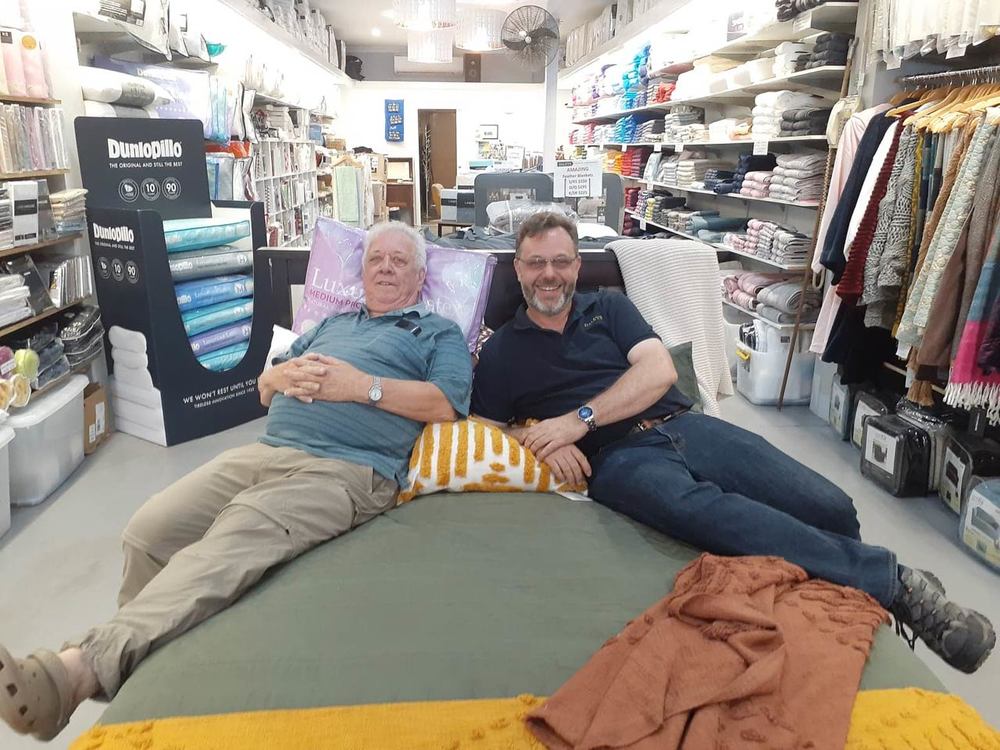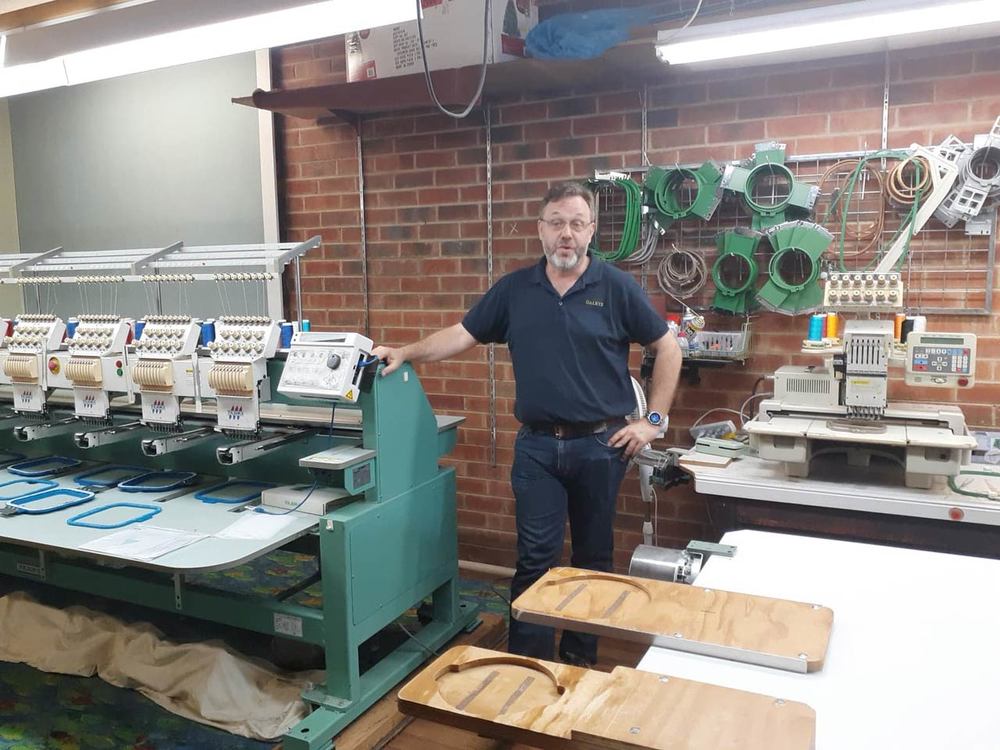SUNDAY PROFILE: John Daley & Matthew Healy on 30 years in business
Liina Flynn
26 October 2019, 8:49 PM
 John Daley and Matthew Healy at Daleys Homewares and Monogramming on Woodlark Street, Lismore.
John Daley and Matthew Healy at Daleys Homewares and Monogramming on Woodlark Street, Lismore.From the changing tastes in sheets, to understanding thread count, John Daley and Matthew Healy from Daleys Homewares and Monogramming on Woodlark Street have seen a lot over three decades.
There’s been floods and a change of premises and owners, but the family business is still going strong.
The biggest embroidery business in regional NSW is celebrating 30 years of being in business and John and Matthew shared their journey with The Lismore App as they remembered the changing face of the Lismore business over the years, the friendships and the practical jokes with neighbours.
John Daley is now retired from running Daleys Homewares and Monogramming, and he’s passed the business on to family member Matthew Healy.
John originally started the business in October 1989 in the Strand Arcade, with his wife Nolene and their three children who helped out in the shop.
“I used to work for Macleans (Glynns-Mac) and I could see they were having problems, so I thought I’ve got to get out of here,” he said.
“They sold the building and it turned into an arcade, and that’s where I opened a shop.
“Then, in 1996, I shifted to the location the shop is now in.”
Manchester history
“I was always interested in selling Manchester – I had a job selling it as a kid,” John said.
“All the sheets and towels used to come out from England on a boat and Australians had no idea what manchester was – they called it sheets and towels.
“It was never going out of fashion.
“Sheets used to be all made of heavy cotton, but tastes have changed.
“Sheridan made it easy for me - they became a big name and quilt covers were seasonal with different patterns.
“In the 60s and 70s there were lots of European locals here, and they wanted continental quilts.
“We had no idea what they were talking about.
“Australians used a blanket on top of the bed that didn’t go over the sides of the bed. Then the feather doona became popular here and Australians put a sheet under the doona – they don’t do that in Europe.
“It’s so Australians didn’t have to wash the doona cover all the time.”
Changing tastes
“It’s more humid here – the Australian climate is different,” Matthew said.
“I sell 10 natural sheets to one poly sheet. Polys are slower selling than they used to be four years ago.”
“In the 1970’s people didn’t want to buy fitted sheets when they first came in – because they didn’t look right when they were hanging on the washing line,” John said.
“People couldn’t fold them properly – and they still can’t.
“There are no flat sheets sets sold now, always mixed fitted and flat.
“Now people like buying soft throws, blankets, pillows and cushions. There’s good money in cushions.”
John said at one stage, he wanted to open a cushion shop.
Home beautiful
There’s a home beautiful consciousness that their shop fulfils, and there will always be a need for sheets.
“It’s a throw away world,” John said.
“We used to keep sheets until they had holes in them, then they would get cut in half and the outside edges sewed back together.”

Family
Matthew said John’s grandmother is his great grandmother.
John’s family is originally from Alstonville - where the Daley family had made a name for itself – even the main street of Alstonville is called Daley Street.
Matthew used to work in the corporate sector and decided to retire.
That’s’ when John decided to sell the business and Matthew jumped in.
“I heard Matthew had retired and I said to him ‘do you want to sell Manchester?’,” John said.
“Just because I went into retirement doesn’t mean stop,” Matthew said. “If you stop, you die. My father was the same.”
The ‘old days’ of the Lismore block
John said when he first opened the shop, there were no empty shops around the block.
“As a kid I’d walk around the block shopping with mum,” he said. “There were so many shops.
“Molesworth Street used to be the main street and the whole inside block was retail, but now it’s lots of real estate and coffee shops and banks.
“There used to be a lot more variety in the shops too.
“These days, there’s lots of individuals in business around the block, like Maven and Bohotopia - rather than the chain stores you see in Lismore Shopping Square.
“People these days often go shopping up the coast at Pacific Fair now we’ve got a fast highway.”
The ‘sales’ days
John said he remembers the after Christmas sales in the 1980’s and early 90s.
“We had a security guard on the door – it was one out and one in.
“In 1997, we had a sale with 10% off in the first hour till we reached 30% off. I made a month’s income in one day.
“Things have changed now, newspapers are dead, TV is not what it used to be, and online advertising has changed everything.”
Matthew said he made a decision to not have sales anymore, because “we have the best price every day”.
“There’s not a high margin of profit in what we sell, he said.
What is thread count in sheeting?
“People don’t understand thread count,” Matthew said.
“1000 thread count doesn’t mean that its better. They often have two threads twisted together to bring the number up.
“I tell them to feel the sheets. You need to open the packet and feel it.
“Bamboo might not be to everyone’s taste because it has a silky feel.
“There’s no Australian standard for thread count.
“To make the thread count look bigger, they just change the measurement they look at when counting threads.
“For example, rather than threads per centimetre, it is counted in threads per 10 centimetres to make it up to 1000 thread count.
“If there’s 1000 crap threads, it’s a crap sheet.”
“They used to count threads using a thread counter. It’s like a magnet and a pin,” John said.
Competition and shopping local
“In my era, everything was all Australian made,” John said.
“Now there’s so many things made overseas and the prices are lower.
“But we advertise that we sell Australian made products and people want to buy them and support local industry.
“Places like Big W might sell manchester that’s cheaper, but it’s bottom of the market.
“People often think the big chains are cheaper – like Kmart and Spotlight.
“The products have lower quality and they are not necessarily cheaper.”
“People come in and tell us they like to shop locally,” Matthew said.
“It’s a tough retail business.
“I’m lucky we have good neighbours – especially in times of flood.
“We look after each other and joke around."
John tells the story of how he swapped the roll-a-door of his shop with Blueys one and didn’t tell John the owner.
“We were watching him trying to close it from across the road at the pub, but it was too small for his door,” he said.
“We were all laughing. We swapped it back later.”
Floods
When John moved into the Woodlark Street shop, he loved that it had an upstairs area “which was good in case of flooding”.
“I always had a flood plan, but never had to move stuff after the 1989 flood.
“It was after I sold the business to Matthew that the 2017 big flood came.
“In 27 years, we never had a flood in the shop till then.”
Matthew said when the 2017 flood did come, he packed everything onto shelves just above the high water flood level at 1.2 metres.
“On the Thursday it flooded, I started lifting and my neighbours, John and Dianne from Blueys Café helped me lift everything – it took eight hours.
“We had 900 ml on the floor of the shop for three days while the water was in the town.
“We were open on the Monday after the flood but we couldn’t find the cash register until the afternoon,” he laughed.
“We used to have carpet here, but it’s just concrete now. So we can hose it out and get the flood gunk off - otherwise you can’t get rid of the smell.
“After the flood, we cut our big display table in half so we could lift them more easily.
“Shop owners need to fit out shops with floods in mind - and make them as flood resilient as possible.”

Matthew Healy in the upstairs area of Daleys Homewares and Monogramming on Woodlark Street with the embroidery machines.
Embroidery
Upstairs in the shop, there’s a workshop where monogramming of materials takes place.
“We’re the biggest embroidery business in regional NSW,” Matthew said.
“It’s a big part of our business - we do a lot of embroidery on work clothes and we get a lot of requests for towels at Christmas.
John said his wife Noelene was always interested in embroidery and that was the spark for him to buy a 500kg embroidery machine in 1997 for $34,000.
“I had to get the roof lifted off and a crane to bring it in,” he said. “I bought an even bigger six head machine later for $50,000.”
Now, Matthew has updated the computer systems that work with the machines.
“It’s a timeless industry,” Matthew said.
“I love getting orders from people for bespoke embroidery pieces, like tablecloths.
“It’s all about you.
It’s all about the people
Both John and Matthew agree that the connection they make with customers is one of the most rewarding things about being in business.
“I like to talk to people,” Matthew said. “I listen to them – people want to be acknowledged.
“They walk in and we welcome them and say hello.”
John said he has seen generations of families walk through the door.
“People come in and say ‘you knew my grandma’,” he said.
“I’d even cash personal cheques for people, It’s the simple things in making relationships with customers that make the difference.”
Their business sponsors a local football team and donates items to people in need, including towels and vouchers to recently affected bushfire victims.
“We are part of this community and Lismore is a better place that we are here,” Matthew said.
To celebrate the businesses 30th birthday, they are having a small private celebration this weekend to reflect on the last three decades.
One of the things they are both glad to see is that the shop now has air conditioning.
Although it’s a bit late for John’s wife Noelene.
“Noelene told me she would retire if I didn’t get air-con,” John laughed.
SHOP LOCAL
